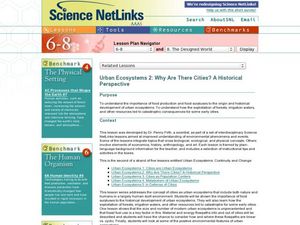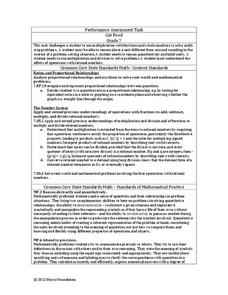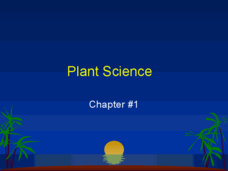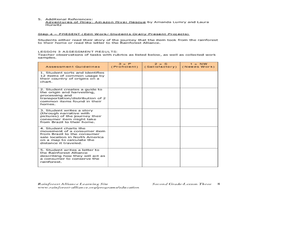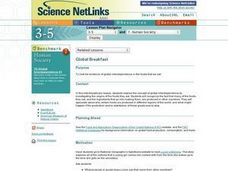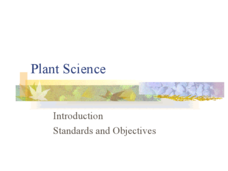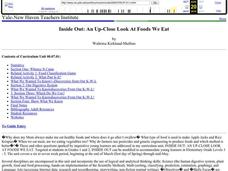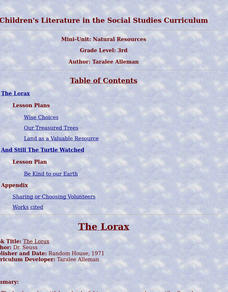Curated OER
Food Without Oil
Students discuss the oil crisis and how it affects the food they eat. In this food production lesson, students look at the foods sold in their grocery store and imagine which would leave if there was no oil to ship the food. They watch...
Curated OER
Urban Ecosystems 2: Why are There Cities? A Historical Perspective
Second in a series of five lessons, this lesson encourages preteens to consider cities as urban ecosystems. First, they keep a food diary for a few days. They visit the Natrional Agricultural Statistics Service website for current data...
Curated OER
Urban Ecosystems 2: Why Are There Cities? A Historical Perspective
Students investigate the importance of food surpluses to the historical development of urban ecosystems.
Smithsonian Institution
Be a Food Detective
What are packaged food products really made of? This lesson will prompt your learners to consider and investigate the source of ingredients in their food. They begin by breaking into groups and analyzing food labels by identifying...
Really Good Stuff
English/Spanish Cognates: Food
Everyone loves food! Help your English language learners pick up some vocabulary with a series of activities based around cognates and food. Pupils practice each word and focus on the words in-depth by filling out Frayer model...
Curated OER
Wow! You're Eating Geography
Learners examine patterns of food producing areas, and identify foods that are grown locally, in the U.S., and around the world. They map and graph the major food crops of their local area, the U.S., and other countries, and discuss the...
Curated OER
Where Did Foods Originate? (Foods of the New World and Old World)
What do papayas, peanuts, pineapples, and potatoes have in common? Why, they are foods explorers brought back to the Old World. Young researchers use the Internet to investigate how New World explorers helped change the Old World's diet....
Agriculture in the Classroom
Understanding the Columbian Exchange Through Old World and New World Foods
If you're interested in teaching your class about the impact of the Columbian Exchange on contemporary society, this is worth a look. The plan begins with an introduction to the topic, which stems from a cell phone poll...
Curated OER
Agriculture in Your Life
Students examine the agricultural sources of everyday products and identify food products outside traditional farming circles. They discuss the background information, and complete activity sheets, locating various commodity locations on...
Noyce Foundation
Cat Food
Determine the right mix of cans of cat food. The resource consists of an assessment task to determine the cost to feed two cats for a specific number of days and requires scholars to interpret remainders within a context. The resource...
Curated OER
Plant Science Chapter #1
It may not stand as a cohesive presentation, but individually you may find a use for these slides. One slide describes how civilization began once man learned to plant and harvest food. Another explores the population growth over time....
Curated OER
Products from the Rainforest
Second graders write a story about the journey a food has from the rainforest to your table. In this food lesson plan, 2nd graders research different foods and products that come from the rainforest and discover how it ended up in their...
Curated OER
Global Breakfast
Young scholars explore different cultures. In this global interdependence lesson, students discuss how food is produced and distributed. Young scholars discuss different cultures and foods they eat. Students search the National...
Curated OER
Agriculture in Your Life
Students explore the origins of food and other everyday products around the United States. In this agricultural lesson, students learn basic vocabulary and practice matching common items with their agricultural source. They categorize...
Curated OER
Plant Science Introduction
A unique PowerPoint explains the basics of plant science. It motivates viewers to study plant science and then lists different food products, biofuels, fibers, timber, and ornamental uses of plants. It concludes with lists of careers...
Curated OER
The Quicker the Better? Food Processing
Sixth graders evaluate the nutrition of various foods. In this healthy eating lesson, 6th graders discuss the processing of many common foods and what this means. Students identify and research unfamiliar ingredients in processed foods...
Curated OER
Farm Products Help Me Grow
Learners view a display of empty food containers (or illustrations). They select a food and decide as a class if it has an animal or plant origin. Students view a display of common farm animals that are commonly eaten (cow, pig, chicken,...
Curated OER
Inside Out: An Up-Close Look At Foods We Eat
Fourth graders identify the origins of meats and vegetables consumed by humans on a daily basis. They classify foods (meats, dairy products, grains...) and create a food pyramid.
Curated OER
The Learning Network Fill-In: When the Food Writer Is a Ghost
Introduce your class to ghostwriting while practicing comprehension. From The New York Times' The Learning Network, this article covers the topic of ghostwriting for cookbooks. There are blank spaces and a word bank. Learners can use the...
Curated OER
Food Choices: A Socio-Cultural Decision
Students discuss their food preferences. Using a flannel board and food models students describe what they would like to eat for dinner. Students compare their selections with their classmates. Students identify the nationality of ethnic...
Curated OER
Land as a Valuable Resource
Learners investigate why the soil is important to our lives. In this natural resources lesson plan, students have a farmer as a guest speaker. Learners begin to understand how farmers use and protect our natural resource. Students write...
Curated OER
Economics Study Guide
Use this resource as a basic review of economic principles. There are six questions relating to the factors of production, opportunity costs, wants and needs, tangibles and intangibles, and more.
Earth Day Network
The Neolithic Revolution
With the abundance of food products we can easily access in our society today, it is easy to forget the toll this can take on our global environment. Young learners will discover how the transition to agriculture and domesticated living...




